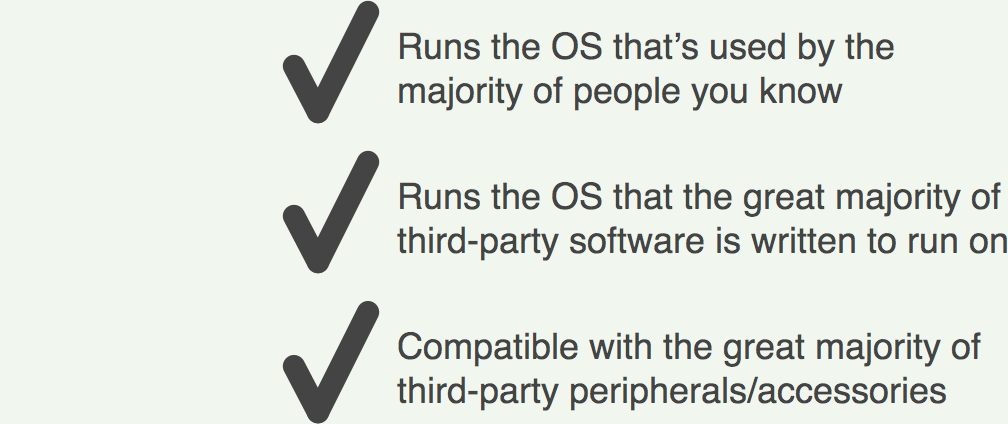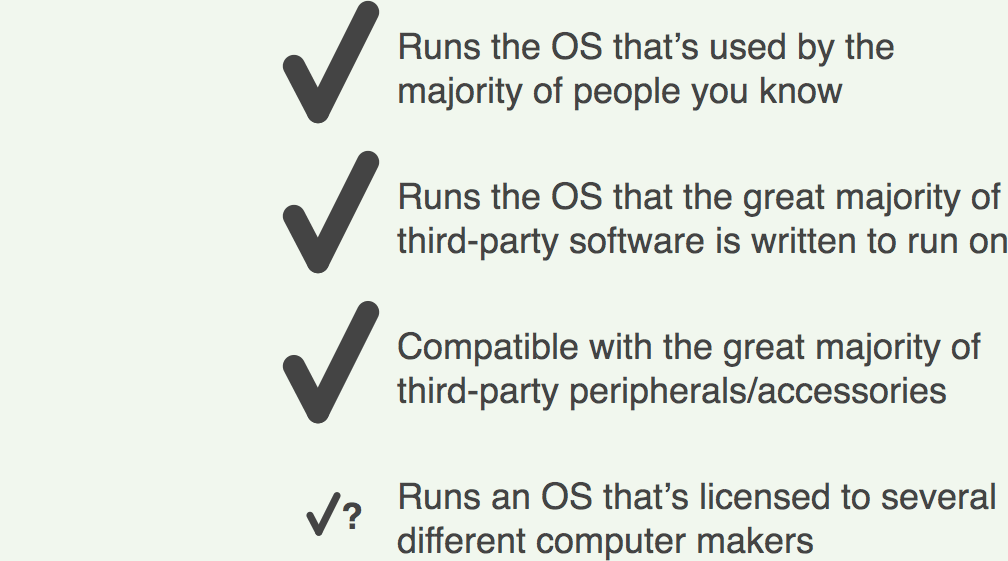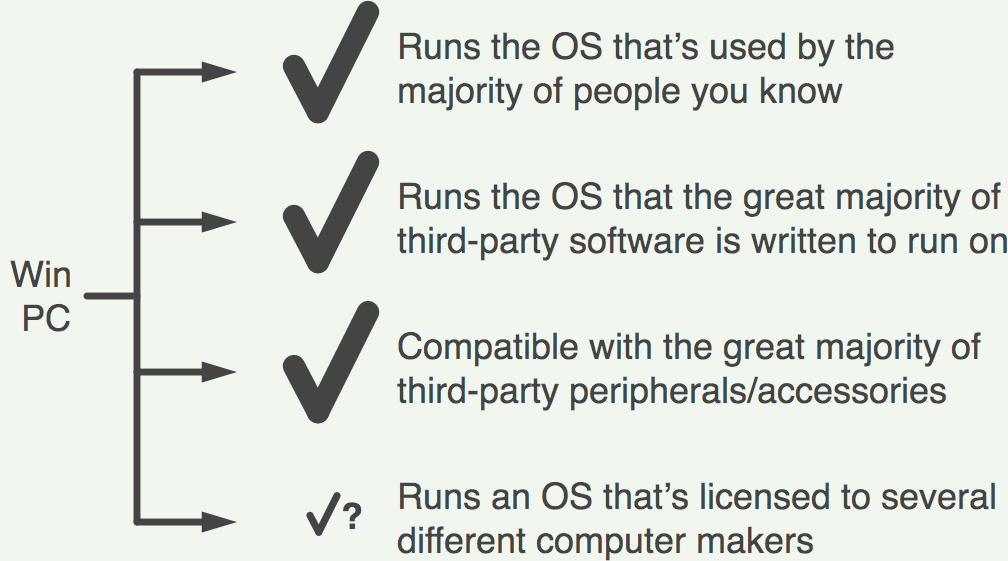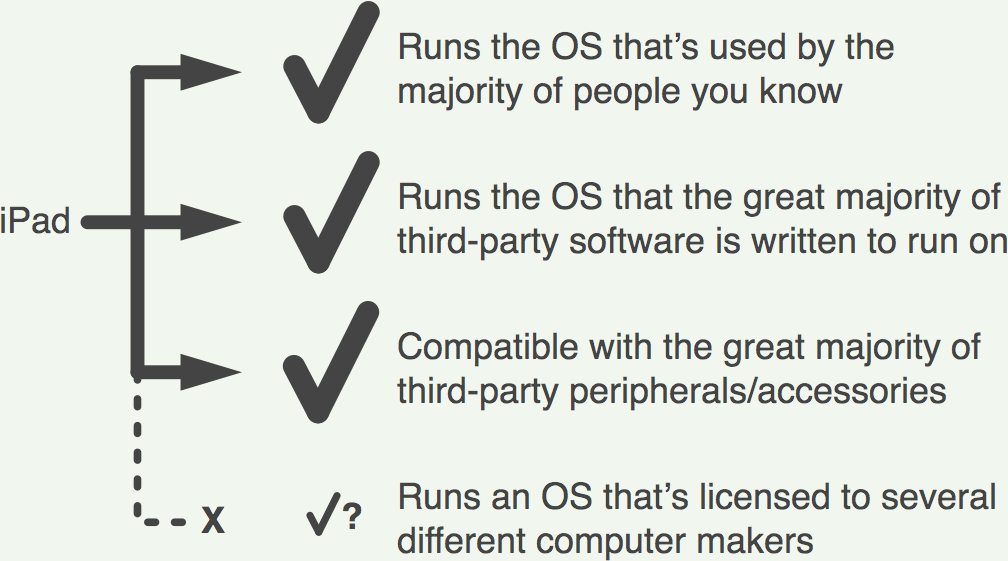
The Self-Fulfilling Prophecy That Wasn’t
DAN Frommer in Business Insider:
“Here’s Apple’s Weak Non-Answer To Why Android Won’t Torch The iPhone Like Windows Did To The Mac”
“Why isn’t Android a Windows repeat? Why won’t it crush your growth, especially in the U.S.? Tim Cook responded with a big, fat non-answer. Basically, he just said a bunch of things that could be summarized by: Apple is awesome! And Android is crap!”
Dan Frommer is hardly alone in pushing this message. When it isn’t Frommer, it’s Blodget, or Lyons, or Grinda, or Gralla. Or Wilson, or Wilcox. Or Weintraub. Or Noyes. Or Kneale. Or Reisinger. Or Arthur. Or Munster. Or Moritz. (Or Martellaro — what the hell?)
Dan, maybe Cook didn’t want to spend five or ten minutes answering your absurd, loaded question. But since you wanted the answer so badly (you did, didn’t you?), I’ll provide it for you, right here.
Check
The year is 1991. And I’m a typical person who wants to buy a desktop computer. (That’s what everybody uses in 1991.) I’m not biased towards any particular system; I just want whatever’s best for me in the current circumstances. But I don’t know that much about the available options, so I go to a friend of mine who knows more about computers. (This friend is also unbiased; he just wants to help me as best he can.) I ask this friend what kind of computer to get, and he says, “Let me ask you a few questions.”
“OK,” I say, “shoot.”
“First: Do you want a desktop computer that runs the same OS that most of the people you know — friends, relatives, associates, etc. — are running on their desktop computers?”
“Uh, yes! That sounds like a great idea,” I reply.
“OK, so write that down and put a big checkmark by it.”
So I do:

“Second,” he continues, “Do you want a desktop computer that runs the OS that the great majority of third-party apps and games are written to run on?”
“Heck yeah!” I exclaim, “That sounds even more important than the first thing you said.”
So I write that down too:

“Third: Do you want a desktop computer that works with the great majority of third-party hardware peripherals, cables, accessories, and such?”
“Wow; sounds great. I do.”

“And finally,” my friend asks, “do you want a desktop computer that runs an OS that’s licensed to several different makers of desktop computers?”
“Uhh.. what? Hmmm. I — I don’t know. Do I?”
“You tell me. I’m asking the questions.”
“Gee. I don’t know. That could be a good thing. Or maybe not? Gosh. OK, let’s say this. Competition is good, right? So let’s say, yes, I want that. But I’m not totally sure. I’ll give it a little checkmark, and a question mark too.”

“Great,” says my friend. “So here’s the deal. If you buy a Windows, x86 PC, you get all four of these things.”

“Oh, well, why didn’t you say so? That’s what I want!”
And that’s why Windows dominated the desktop computer market all through the ’90s. And still to a great extent today.
Now, jump forward twenty years. It’s 2011. And I’m a typical, unbiased consumer who wants to buy a tablet. I’ve seen all this stuff about tablets, and I want one. But I don’t know exactly what kind to get. So I go to my (still unbiased) friend and ask him which tablet to buy. He asks me the same four questions: Do I want a tablet that runs the OS that most of my tablet-using friends, relatives, and associates are using? That runs the great majority of tablet apps? Etc. And I give him the same four answers I did in 1991:

“OK,” he explains, “here’s the deal. If you get an Apple iPad, you get these first three things. And you get them to an even stronger degree than you ever did in 1991 with a Windows desktop computer. But — you don’t get this fourth item at all.”

So what do I (the typical, unbiased consumer) do? Of course: I buy an iPad. I might be a tiny bit concerned about missing out on item #4, but I was never really sure I wanted that in the first place. There’s no way I’m going to sacrifice any of the first three items (not to mention all three of them) to get #4. And that goes in spades if the only reason I thought #4 was a good thing was because Windows PCs were dominating the market and I thought there was lots of room for many different PC makers to provide a piece of that. If non-iPad tablets are a tiny portion of the market, then maybe it would be a very bad thing if several companies had to share that tiny portion of the market.
What the anti-Apple pundits are trying to do is conveniently overlook the three elephants in this diagram, and instead focus on the last item: the mouse. They’re trying to spin a story where the reason that Windows dominated the PC market wasn’t because of any or all of the top three items — it was just because it was licensed to multiple vendors. And so, of course, whatever system is licensed to multiple vendors today is guaranteed to win. Eventually.
It helps the plausibility of their story, of course, that Apple sells the non-licensed option in both the 1991 and 2011 scenarios. So long as no one notices (they hope) that iPad has all three of the monster checkmarks that Windows had twenty years ago, then no one will realize how fantastically unlikely it is that Apple will lose this time around.
Non-Self-Fulfilling
Blodget, Wilcox, et al. are trying to create a self-fulfilling prophecy where they get people to shun the iPad because people don’t want to be stuck holding an iPad after Apple is driven into a tiny niche share of the market. So people don’t buy the iPad, or not very much — they mostly buy Android because they’ve read these articles. And so it becomes a self-fulfilling prophecy that causes Apple to fail. (Of course, if it happened, Apple wouldn’t actually have failed because of anything to do with licensing or Windows-vs-Mac parallels, but rather because of pundits steering the consumer away from Apple’s products. But these pundits wouldn’t mention that; they would just say, see, we were right about OS licensing.)
Back in the early days of personal computing, the late 1970s or early ’80s, it might actually have been possible to create a self-fulfilling prophecy like that, because most of the people who were buying the computers were people who read geeky articles, who read tech reviews, tech magazines, etc., written by people who attended COMDEX and CES, and talked about what they saw there, and all that stuff.
Today (as exemplified by the actual death of COMDEX seven years ago), that situation doesn’t really exist. What Apple was trying to do all along was make computers an every-person tool, that would not be primarily the province of techie nerds. And they’ve succeeded. (It wasn’t just Apple, of course — the transition was occurring even during the Windows heyday. But Windows had to be a close copy of Apple’s Mac in order to be able to do that.) We’re getting to the point now where the vast majority of people who purchase these products are people who don’t even know about these tech blogs. They don’t read them. And if they occasionally read one of them, they don’t take it seriously, especially if it doesn’t seem to jive with what they’ve been noticing on their own in the market.
And today you can combine that effect with Apple having their own retail stores, which means a whole bunch of consumers, you know, hear about the iPad; they see commercials for it; they go to the Apple store, they look at it, and they buy it. They never even come in contact with the whole world of anti-Apple people. They don’t read the reviews by the anti-Apple pundits. They don’t get steered in the wrong direction by anti-Apple clerks at some mammoth computer-stuff store. There’s simply a ton of people out there who are more than happy to just go to the Apple store, love what they see, and buy it — and they don’t even come in contact with the anti-Apple sphere anymore.
So this whole idea of creating a self-fulfilling prophecy of Apple failure? It’s impossible. It might have been possible in the late ’70s/early ’80s to do something like that, but not now. These pundits have influence in a very narrow segment. And the vast majority of the computer-buying public now doesn’t read these pundits’ writings, doesn’t even know they exist. What percentage of iPad owners know there’s such a person as Henry Blodget? How many have even heard of Fabrice Grinda? They haven’t. They don’t know who these people are. And if by some chance they’re sitting in a doctor’s office and they happen to read an article by one of these guys (assuming they have articles in paper magazines), then they would be, like, “Gee, this seems rather odd. It doesn’t jive with anything I’ve been observing.” And then they wouldn’t see anything like that again. And so they would dismiss it as some sort of weird crank.
Now, of course, what that typical consumer wouldn’t know is that these guys really are not cranks. They’re the majority in their techie world. (Or at least a very sizable chunk.) But Apple doesn’t need to sell to that techie world anymore. If every techie nerd — every guy who wants to tinker, and wants to be a guru to his friends, and all that — buys an Android tablet, but all the typical people go out and buy an iPad? Then Apple gets, you know, 80 or 90% of sales. And so who cares?

Update 2011.07.22 — For a mere $7K, you can read the details of Strategy Analytics’s report, “Global Tablet OS Market Share: Q2 2011,” and read about how the iPad has dropped from over 90% of the tablet market to about 60%. And I’m sure it’s all valid — units shipped always equals units sold, right? Sounds crazy, I know, but seriously — what else were you gonna do with seven thousand dollars.
See also:
The Innovator’s Victory

 design by
design by